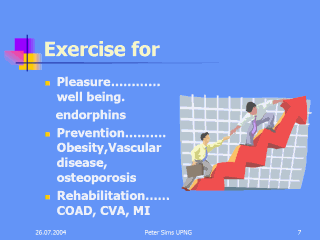| front |1 |2 |3 |4 |5 |6 |7 |8 |9 |10 |11 |12 |13 |14 |15 |16 |review |
 |
Exercise is
enjoyable, and more exercise is more enjoyable………when activity is undertaken
the body releases its own endorphins or "natural morphines" which prevent
pain and provide "a high". Athletes can become "addicted" to their training schedules and if for any reason they cannot train suffer the misery and withdrawal of the addict. Regular exercise is important in maintaining body weight, probably by reducing appetite. The blood sugar level tends to drop lower in people when they are not exercising-they feel hungry and are more likely to "snack" on easily available carbohydrate. Exercise to lose weight is not particularly effective - a kilogram of fat is the equivalent of 9,000 kilocalories or two/three days of vigorous exercise. Exercise in building fitness after acute illness or in improving performance in chronic disability is well proven. Performance can be increased, morale raised and quality of life enhanced by being able to walk 20 metres rather than 5, to be able to wash and shave without becoming totally incapacitated. |